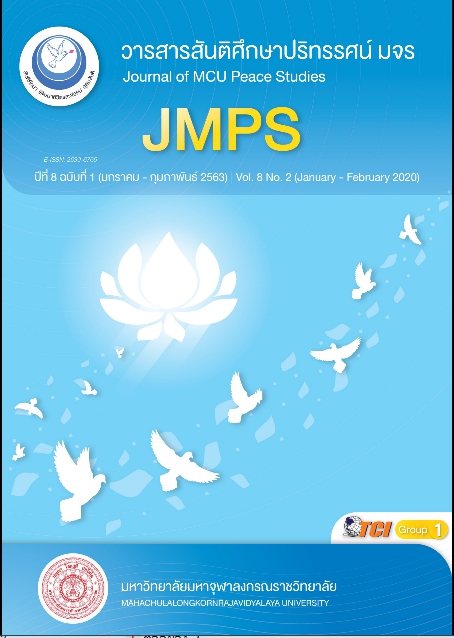Sufficiency Economy based Community Development Management for Reducing Inequality among the Poor Households
Main Article Content
บทคัดย่อ
This research aims to analyze the level of community development management towards the participation in social inequality mitigation, relevant activities and the application of the sufficiency economy philosophy by both individuals and households. The data was collected by the use of questionnaires with 1,200 samples as well as interviews with 20 community leaders from the sufficiency economy-based model villages in three poorest provinces in the northern region: Maehongsorn, Prae and Nan. The research results showed that strong household leaders participated in the community development management for mitigating social inequality at high level. They also received direct benefits from the activities under the village development projects organized by the public sector. In addition, they were proud of the fact that their villages, families, neighbors and the public as a whole engaged in the conducted activities at high level. In terms of practicing sufficiency economy-based activities individuals and in households, such practice was rated at high level in overall and by indicators, especially in regard to natural resources preservation and common sufficient way of living. The application of the sufficiency economy philosophy by both individuals and their households was executed at high level, mentally in particular. They believed in the philosophy which suited them. They did not exploit others, and were satisfied with their sufficient way of life. They could genuinely synthesize the participatory society of happiness towards the participation process for creating a pleasant society based on the sufficiency economy philosophy—“Rectangular Ridge Model of Sufficiency” which simultaneously adheres to both nature and Buddhism.
Article Details
ทัศนะและความคิดเห็นที่ปรากฏในบทความในวารสาร ถือเป็นความรับผิดชอบของผู้เขียนบทความนั้น และไม่ถือเป็นทัศนะและความรับผิดชอบของกองบรรณาธิการ ยินยอมว่าบทความเป็นลิขสิทธิ์ของวารสาร
เอกสารอ้างอิง
Bhumibol Adulyadej, His Majesty King. (2009). The Guidance of His Majesty the King: The Royal guidance and Speeches on Sufficiency Economy. Pradabos Foundation. (8 ed.). Bangkok: Bangkok Printing.
Cohen, J. & Uphoff, N. (1980). Participation’s place in rural development: Seeking clarity through specificity. World Development, 8, 213-235.
Gazette, G. (1997). The Constitution of the Kingdom of Thailand 1997. Book 114, Part 55 A, 11 October 1997. Retrieved October 1, 2016, from http://www.ratchakitcha.soc.go.th/DATA/ PDF/2540/A/055/1.PDF
Gazette, G. (2007). The Constitution of the Kingdom of Thailand 2007. Book 124, Part 47, Retrieved October 1, 2016, from http://www.ratchakitcha.soc.go.th/DATA/PDF /2550/A/047/1.PDF
Office of the National Economic and Social Development Board (NESDB). (2011). His Majesty the King Working Principles. Bangkok: Prechrung printing Center.
Office of the National Economic and Social Development Board (NESDB), (2016). Poverty Analysis and Inequality Analysis in Thailand 2015. Bangkok: Office of the National Economic and Social Development Board.
Phukamchanoad, P. (2009). The Participation of Community Committee in Sub-community Development in Dusit District, Bangkok. Suan Sunandha Rajabhat University.
Phukamchanoad, P. & Khadthipong, P. (2012). Research project to develop and solve social inequality in Bangkok Wat Prachuapru Tham Community 1-4, Dusit District, Bangkok. Suan Sunandha Rajabhat University.
Phukamchanoad, P. (2014). Guideline for Happy Living According to Sufficiency Economy Philosophy of People and Community Leaders in Urban Communities. International Journal of Social, Management, Economics and Business Engineering, 8(6), 1900-1903.
Poonlab, S. (2011). Social Capital and Self-Independence Based on the Sufficient Economy Philosophy of the Minority Group in Mhok Jam Royal Project. Doctor of Philosophy Program in Development Administration, Suan Sunandha Rajabhat University.
Silpcharu, S. (2006). Research and Analyze Statistical Data by SPSS. (5 ed.). Bangkok: V. inter print.
The Chaipattana Foundation, (2007). Sufficiency Economy and The New Theory. Bangkok: Amarin Printing & Publishing.
Yamane, T. (1973). Statistics: An Introductory Analysis. (3 ed.). Tokyo: Harper.


